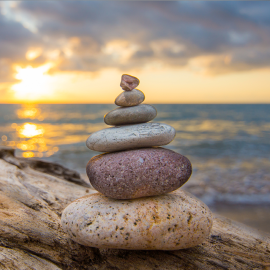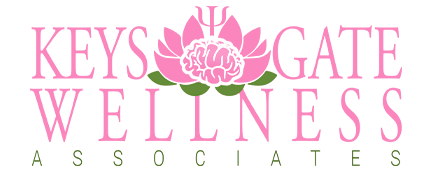Self-Care September
Friday, September 18, 2020
Written By: Dr. Milca Y. Garay Figueroa

The Journey To Self-Care In The Modern Century
What Is Self-Care?
To connect with this article, i encourage you to begin looking at the pictures with every reading. This will be a journey of self-care with one of my favorites hobby’s photography. Because self-care is about connection, kindness, experience, time with ourselves and so much more. The word “self-care” is divided in two: “self” means own and “care” implies the action of attending, assisting or caring according to the needs. Therefore, self-care is the action of attendance, protecting and preserving emotional, mental, physical and spiritual, among other areas of your being as social, professional and financially. Like these rocks in the beach, they have different colors, sizes, weight, textures and represent that harmony and balance that self-care provide us in order to maintain them together.
However, the world health organization (who) defines self-care as “the ability of individuals, families and communities to promote health, prevent disease, maintain health, and to cope with illness and disability with or without the support of a healthcare provider” (world health organization, 2020). Research shows that the core aspects of self-care contribute to 60 to 70 percent of the chronic diseases we know in this world” (Healthline, 2020). In addition, reducing stress help to improve immune system (Harvard, 2020).

This means self-care needs to be something people actively plan, rather than something that just happens. When i used the word plan many people would think about all the reasons that prevent them from achieving this. Furthermore, research has found that people think self-care is something for individuals with enough time or money. But is important we reflect in the following questions:
1. Is there really not enough time when a day has 24 hours and a year has 365 days?
2. Do you need money to practice self-care?
As you see in the picture, time is something given to all human being and we are the ones that manage our time schedule in different forms. Time management can be a challenge, yet the first step is being aware of it and then take action. For example, let’s reflect in those times when people are required to schedule a time to assist to a medical procedure or a new job training meeting because that is something no one else is able to do for you. In those scenarios people need to find the time. Consider self-care as a proactive response that requires you to identify your needs in other to fulfill them.
In relation to the second question, Agnes Wainman (2020) defines self-care as “something that refuels us, rather than takes from us.” that’s why if self-care is taking away your money, time, joy, happiness is not self-care. Self-care means you are able nourish and take care of your needs, established boundaries when is necessary and take actions to help others. Gracy Obuchowicz (2020) says “numbing behaviors, like drinking, eating, or surfing social media in excess, are often mistaken as self-care”.

Brianna Wiest (2020) defines self-care in a lovely way “true self-care is not salt baths and chocolate cake; it is making the choice to build a life you don’t need to regularly escape from”. Don’t let this modern time let you think using candles and eating ice cream is what self-care has to offer you. Sometimes people do things like sleeping too much, eating too much or spending time ignoring the chores and all kind of things that make them feel regretful the next day. Self-care is meant to be a daily nourishing experience in the here and now, not procrastinating or productivity. Self-care is accompanied by kindness to the self and others.
The challenge for today, is that you choose one of the self-care areas and spend time with yourself, to promote your wellness and do not wait until you are lasting or ending your battery charge. Difficult times limit us in many ways, but it also provides us opportunities for change. As you are looking at the above picture, remember connecting with nature and also quiet moments provide us opportunities for gratitude as well as mental health self-care.
You can find many self-care tips, but here are the ones that i found to be more helpful in the references:
1. Prioritize all the self-care areas: emotional, physical, social, spiritual, personal, community (space), professional and financial. Remember mental health is as important as other areas in your life.
2. Set up a self-care routine. a 21 days self-care routine can be a good way to acquire this practice as a habit. As you will do when you are trying to lose weight, you will go to the scale and measure your weight, to be able see the changes, those trending “before and after”. Is important you compare yourself in the “self-care journey as well.
3. Choose actions or practices that are low or no cost. this can eliminate many barriers between the person and the successful execution and consistency of the activity, strategy and action.
4. Adopt strategies that are small and easy to incorporate into daily life: ensuring that our self-care strategies are small and manageable will help us effectively incorporate them into our daily life without feeling like we have just added something new to our to-do list that will made us feel overwhelmed.
5. Do at least one relaxing or pleasurable activity every day. walking, or spending 30 minutes unwinding, meditating, praying, yoga or exercising.
6. Find strategies that reduce your stress in the immediate moment. think about what helps lower your stress response and how you could incorporate those actions more frequently, so they become habitual and preventative as well as reactionary. For example, coping mechanisms that we can use in the moment to help reduce our body’s stress response and manage our emotions effectively, such as professional venting, deep breathing, progressive muscle relaxation,walking, and counting to ten.
7. Positive over negative coping skills or strategies. effective positive strategies include problem-focused strategies, in which we concentrate on solving a problem (research, strategizing, asking questions); appraisal-focused strategies, in which we attempt to modify how we think (goal setting, humour, shifting our outlook); and emotion-focused coping, in which we look to alleviate negative emotions (workouts, creative activities). We want solutions to be long-term healthy habits, rather than short-lived rewards.
8. Spend enough time with your loved ones. there is no time machine that can compensate the time lost. Prioritize the quality and not quantity time you spend with your love ones. As you see in the last picture of this journey, including hobbies in your life can also contribute in a positive way to your self-care.
References:
Caldwell, J (2020). Why Self-Care Isn’t Selfish: Caring For Yourself During COVID-19.
Harvard (2020). How To Boost Your Immune System.
Michael, R. (2018). What Self-Care Is — And What It Isn’t
Obuchowicz, G.(2020) Why You Don’t Need A Lot Of Time Or Money To Make Self-Care A Priority

